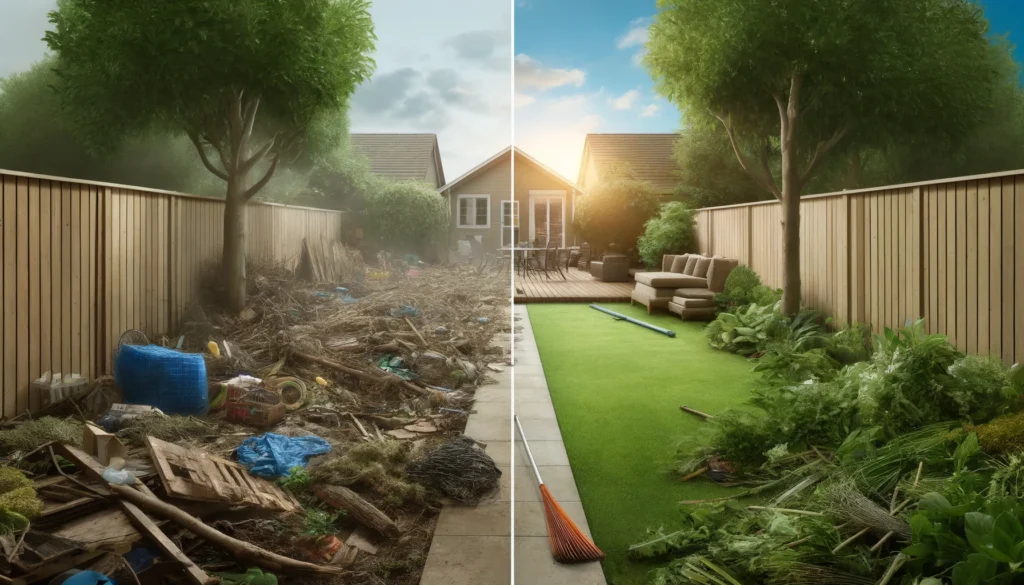
Table of Contents
- Introduction
- The Importance of Yard Debris Removal
- Types of Yard Debris
- DIY Vs. Professional Debris Removal
- Choosing the Right Yard Debris Removal Service
- Environmental Considerations
- Conclusion
- FAQ
- About the Author
Introduction
Maintaining a clean and organized outdoor space is more than just a matter of aesthetics; it’s about creating a healthy environment for you and your loved ones to enjoy. Over time, yards can accumulate a variety of debris, from fallen leaves and branches to more substantial waste like old furniture or construction remnants. This clutter not only detracts from the beauty of your outdoor areas but can also pose health and safety risks. That’s where professional yard debris removal services come in, offering a convenient and efficient solution to keep your garden, yard, or any outdoor space looking its best.
In this article, we’ll explore the importance of yard debris removal, the types of yard debris you might encounter, the pros and cons of DIY versus hiring professionals, how to choose the right service, and the environmental considerations to keep in mind. Whether you’re looking to revitalize your garden after a storm or simply maintain a tidy outdoor area, this guide will provide you with the insights you need.
The Importance of Yard Debris Removal
Removing yard debris is crucial for several reasons. Firstly, it enhances the visual appeal of your property, making it more inviting and enjoyable. A clean yard is not just pleasing to the eye; it’s also more functional, providing clear spaces for activities and gatherings.
Secondly, accumulated debris can be a breeding ground for pests and diseases. Piles of wet leaves, for instance, can attract mosquitoes and other insects, while rotting wood can harbor fungi and bacteria harmful to both plants and humans. By removing these materials, you reduce the risk of pest infestations and plant diseases.
Thirdly, debris can pose physical hazards. Fallen branches and uneven ground covered by leaves can lead to trips and falls, especially for children and the elderly. Keeping the yard clear of obstacles ensures a safer environment for everyone.
In the next sections, we’ll delve deeper into the types of debris you might encounter and how to effectively manage them, comparing DIY efforts with professional services.
Types of Yard Debris
Yard debris encompasses a wide range of materials that can accumulate in your outdoor spaces. Understanding the types of debris you might encounter is the first step in managing your yard’s cleanliness and safety. Here’s a look at the common categories of yard waste:
Organic Debris
- Leaves and Pine Needles: These are among the most common debris, especially in the fall. They can smother grass, block sunlight, and retain moisture, which may lead to mold or disease.
- Grass Clippings: After mowing your lawn, you may end up with piles of grass clippings. If not managed properly, they can clump together and hinder the growth of underlying grass.
- Branches and Twigs: Storms, wind, or natural growth can lead to fallen branches and twigs. While smaller pieces can be composted or mulched, larger branches may require professional removal.
Non-Organic Debris
- Construction Materials: Remnants from home improvement projects, such as lumber, bricks, or tiles, can end up in your yard.
- Old Furniture and Appliances: These items often require specialized disposal methods due to their size and material composition.
- Plastics and Metals: Items like garden hoses, tools, and decorations can deteriorate over time and become yard debris.
Hazardous Debris
Certain types of yard waste can pose significant risks to health and safety and may require specialized disposal methods:
- Chemicals: Fertilizers, pesticides, and herbicides must be handled carefully to prevent contamination of soil and water sources.
- Diseased Plants: Plants infected with pests or diseases can spread the problem to healthy vegetation if not removed and disposed of properly.
DIY Vs. Professional Debris Removal
When it comes to yard debris removal, homeowners have two main options: tackle the job themselves or hire professional services. Both approaches have their benefits and drawbacks, which we will explore in detail.
DIY Removal
Pros:
- Cost-Effective: Handling debris removal yourself can save money on service fees.
- Flexible Timing: You can work at your own pace and schedule the cleanup according to your convenience.
Cons:
- Time and Effort: Depending on the size of your yard and the amount of debris, removal can be time-consuming and physically demanding.
- Equipment and Disposal: You may need to rent or purchase specific tools for the job, and you’ll have to figure out how to properly dispose of the debris.
Hiring Professionals
Pros:
- Efficiency: Professional services have the experience, tools, and manpower to quickly and effectively clear your yard of debris.
- Safety: They can safely handle large, heavy, or hazardous debris that might be risky for an untrained individual.
- Proper Disposal: Professionals know how to dispose of various types of waste responsibly, including recycling or composting organic materials.
Cons:
- Cost: The main drawback is the expense, which can vary widely depending on the scope of the work and the company you choose.
In the next sections, we’ll guide you through choosing the right yard debris removal service and delve into environmental considerations to keep in mind during the process.
Choosing the Right Yard Debris Removal Service
When the decision to hire a professional yard debris removal service is made, selecting the right provider like Lug Out Junk Removal is crucial. The right service can transform your outdoor space efficiently and responsibly, while the wrong choice can lead to frustration and wasted resources. Here are key factors to consider when choosing a yard debris removal service:
Experience and Expertise
- Look for companies with a proven track record in yard debris removal. Experienced providers understand the nuances of handling different types of debris safely and efficiently.
Licensing and Insurance
- Ensure the service is licensed to operate in your area and carries insurance. This protects you in case of accidents or damage to your property during the removal process.
Environmental Practices
- Choose a service that prioritizes eco-friendly disposal methods, such as composting organic debris or recycling salvageable materials. This commitment aligns with responsible environmental stewardship.
Services Offered
- Confirm that the company can handle the specific types of debris you need removed. Some services specialize in organic waste, while others offer comprehensive removal, including construction debris and large items.
Pricing and Transparency
- Obtain clear, upfront pricing to avoid unexpected charges. Reputable services provide detailed quotes based on the scope of work, ensuring transparency and fairness.
Customer Reviews and Testimonials
- Check online reviews and ask for references to gauge the company’s reliability and customer service quality. Positive feedback from previous clients can offer valuable insights into what to expect.
Availability and Flexibility
- Consider the provider’s availability to ensure they can accommodate your schedule. A service that offers flexible timing can be a significant advantage, especially for urgent cleanups.
Environmental Considerations
Yard debris removal isn’t just about aesthetics and safety; it’s also an opportunity to contribute positively to the environment. Here are several environmental considerations to keep in mind:
Composting
- Organic yard waste like leaves, grass clippings, and small branches can be composted, turning waste into valuable nutrients for your garden.
Recycling
- Non-organic materials, such as certain plastics and metals found in yard debris, can often be recycled. Choosing a service that separates recyclable materials can reduce landfill waste.
Hazardous Waste Disposal
- Proper disposal of hazardous materials, like chemicals or treated wood, is essential to prevent environmental contamination. Ensure the debris removal service is equipped to handle such materials appropriately.
Reducing Carbon Footprint
- Opt for companies that use eco-friendly practices, such as fuel-efficient vehicles or electric tools, to minimize the carbon footprint associated with debris removal.
By considering these environmental factors, you can ensure that your yard cleanup contributes to a healthier planet while keeping your outdoor spaces beautiful and safe.
Conclusion
Yard debris removal is an essential aspect of maintaining a clean, safe, and aesthetically pleasing outdoor environment. Whether you choose to tackle the task yourself or hire professionals like Lug Out Junk Removal, understanding the types of debris, weighing the pros and cons of DIY versus professional removal, selecting the right service, and considering environmental impacts are all crucial steps. With the right approach, you can transform your yard into a tidy, inviting space that you and your family can enjoy, all while contributing positively to the environment.
FAQ
Can I burn yard debris as a method of disposal?
While burning yard waste is a common practice in some areas, it’s important to check local regulations as it may be restricted or banned due to the risk of fire and air pollution. Composting or using a professional removal service are often safer and more environmentally friendly options.
How can I minimize yard debris accumulation?
Regular maintenance, such as timely pruning, mowing, and gardening, can significantly reduce the amount of debris that accumulates. Additionally, using ground cover plants or mulch can help prevent soil erosion and reduce weed growth, further minimizing debris.
What should I do with large tree branches or stumps?
Large branches and stumps may require specialized equipment for removal and disposal. Professional yard debris removal services have the tools and expertise to safely handle and dispose of large woody debris.
About the Author
Todd is the owner of Lug Out Junk Removal and has dedicated his career to providing top-notch junk removal services, with a special focus on environmentally responsible practices. His expertise in yard debris removal helps homeowners maintain clean, safe, and beautiful outdoor spaces. Todd’s commitment to sustainability and customer satisfaction makes him a trusted leader in the junk removal industry.
